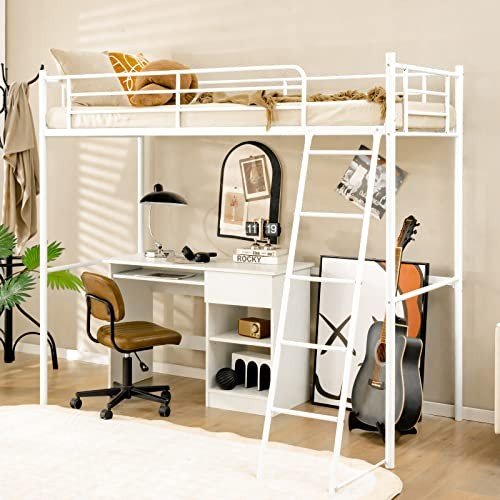Watch Out: How Bunk Beds Is Taking Over And What You Can Do About It
Exploring Bunk Beds: A Comprehensive Guide
Bunk beds have actually long been a staple in kids's bedrooms, dorms, and even homes with limited space. Not just do they offer a useful sleeping solution, however they likewise produce an enjoyable and imaginative environment for kids and a great space-saver for adults and households. This post will check out everything you require to learn about bunk beds, from types and materials to safety tips and purchasing recommendations.
Tabulation
- Types of Bunk Beds
- Conventional Bunk Beds
- Loft Beds
- Triple Bunk Beds
- L-Shaped Bunk Beds
- Material Options
- Wood
- Metal
- Security Considerations
- Purchasing Guide
- Frequently asked questions
Kinds Of Bunk Beds
Bunk beds are available in numerous styles to suit different needs and preferences. Here's a breakdown of the most typical types:
Conventional Bunk Beds
Traditional bunks generally include 2 beds stacked vertically on top of one another. These beds are ideal for siblings sharing a space or for taking full advantage of sleeping space in guest rooms.
Loft Beds
Loft beds stand similarly to traditional bunk beds but do not have a lower sleeping area. Instead, they frequently integrate a desk or seating location underneath, making them a great option for small spaces needing multifunctionality.
Triple Bunk Beds
Triple bunk beds are created for 3 residents, with beds stacked in a three-tier configuration. These are less common but can be a fun solution for big households or sleepovers.
L-Shaped Bunk Beds
With one bed positioned horizontally and the other vertically, L-shaped bunk beds are frequently geared up with extra features such as desks or storage drawers and can complement corner spaces in a space.
Contrast of Bunk Bed Types
Bed Type
Suitable Use
Description
Traditional
Shared bed rooms or visitor spaces
2 beds stacked vertically
Loft
Small rooms needing multi-purpose space
Upper bed with open space below
Triple
Big families or sleepovers
Three beds stacked vertically
L-Shaped
Corner or flexible spaces
A mix of vertical and horizontal beds
Product Options
Bunk beds are produced from various products, with wood and metal being the most common. Each material has its advantages and disadvantages.
Wood
- Durability: Generally robust and can withstand years of use.
- Visual Appeal: Offers a classic appearance that can mix with different designs.
- Weight Capacity: Typically stronger; can support heavier weights.
- Disadvantages: May be more expensive than metal choices and can be prone to scratches.
Metal
- Toughness: Generally light-weight and simple to move however still sturdy.
- Modern Design: Often is available in streamlined styles, making it appealing for contemporary spaces.
- Cost-Effective: Usually less expensive than wood alternatives.
- Disadvantages: Can be cold to the touch in winter seasons and might not have the exact same aesthetic appeal for some buyers.
Security Considerations
When it pertains to bunk beds, security can not be overlooked. Here are crucial security tips to bear in mind:
- Guardrails: Ensure that the top bunk has guardrails on both sides to prevent falls.
- Tough Construction: Check for a solid build and durable products to stand up to weight and movement.
- Weight Limit: Adhere to the producer's weight limitation for both the upper and lower bunks.
- Ladder Design: Choose bunks with a safe, easy-to-climb ladder and avoid any sharp edges or rungs.
- Age Restrictions: Most producers suggest that kids under the age of 6 ought to not oversleep the upper bunk.
Purchasing Guide
When looking for bunk beds, consider the following factors to discover the very best suitable for your needs:
- Space Availability: Measure the space size and ceiling height, making sure there is sufficient space for the top bunk.
- Bed Size: Decide in between twin, complete, or larger sizes based upon your needs and the size of the space.
- Style Preference: Consider the total decor of the bed room to discover an appropriate design.
- Reduce of Setup: Look for a bunk bed that is straightforward to put together.
- Budget: Bunk beds can be found in different price varieties, so figure out a spending plan before beginning your search.
FAQs
1. What is the advised age for kids to sleep on the top bunk?
Kids aged six and older are normally suggested to sleep on the leading bunk to lessen the threat of falls.
2. How can I make my bunk bed much safer?
To boost safety, ensure guardrails are appropriately installed and examine that the bed is put on a flat surface. Additionally, motivate children to utilize the ladder carefully.
3. Can I transform a bunk bed into 2 separate beds?
Many bunk beds are created to be convertible. Examine the manufacturer's specifications for convertibility features.
4. What devices are readily available for bunk beds?
Typical accessories consist of bed linens, storage drawers, staircases rather of ladders, and tented canopies for an enjoyable visual appeal.
5. How do I preserve my bunk bed?
Regular look for loose screws or structural stability can help ensure security. Dust the bed frequently and clean spills without delay to keep the materials in good condition.
Bunk beds are flexible and a space-efficient service for various living circumstances, from kids's rooms to visitor accommodations. With numerous designs and materials readily available, prospective purchasers have a wealth of alternatives to consider, making sure a mix of functionality and aesthetic appeals. By focusing on Bunk Beds For Teens and following the pointers laid out in this guide, individuals can discover the best bunk bed that matches their space and way of life, all while developing a pleasurable sleeping environment.
